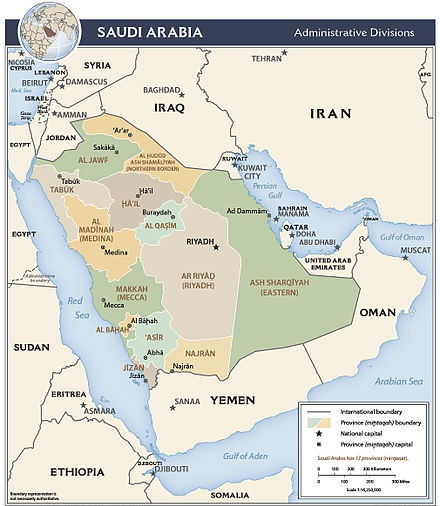Part 1 of 4 parts
Saudi Arabia has been in the news a lot lately because of changes in the government. The Crown Prince who will soon be king has arrested a bunch of powerful Saudi government officials and businessmen and is talking about sweeping changes to the desert kingdom such as moving to a more moderate form of Islam and signing a cooperative agreement with Israel to oppose their common enemy, Iran. Now the U.S. Trump administration is considering providing sensitive nuclear technology to Saudi Arabia.
Although Saudi Arabia is very rich in oil, they want to build their own nuclear power reactors, so they can save their oil for export. They have their own reserves of uranium ore and want to extract and enrich it to fuel the reactors they want to build. It is believed that they want to have the ability to enrich uranium because Iran has that capability. If Iran does ever develop nuclear weapons, it is likely that Saudi Arabia would use their nuclear technology for the development of their own nuclear weapons as a counter
In response to questions about their interest in developing nuclear weapons, Saudi Arabia issued a statement that said, “The Kingdom of Saudi Arabia is a signatory of the Non-Proliferation Treaty, hence is diversifying its energy mix to serve its domestic needs in accordance with international laws and standards. The Kingdom has been actively exploring diverse energy sources for nearly the last decade to meet growing domestic demand.”
While much of the technology used for nuclear weapons is different from that used in nuclear power plants, there is some overlap. In order to make nuclear fuel, it is necessary to enrich uranium to over four percent U-235. Nuclear weapons require enrichment to over ninety percent U-235. The same technology that can enrich uranium for fuel can also be used to enrich uranium for nuclear weapons. In addition, the spent fuel produced by nuclear power reactors can be reprocessed to obtain uranium and plutonium for nuclear weapons. Nuclear non-proliferation organizations and treaties prefer that new members of the nuclear power club buy their fuel and dispose of their spent fuel on the international nuclear market to preclude enrichment and reprocessing.
Saudi Arabia needs permission from the U.S. government in order to receive sensitive U.S. nuclear technology. Previously, attempts to come to an agreement over access to U.S. technology had failed because Saudi Arabia refused to agree to safeguards to prevent the use of the technology for the creation of nuclear weapons. This is called the dual use problem because certain nuclear technologies can be used for either peaceful nuclear power development or for nuclear weapons development.
In 2008, the Saudi government made a nonbinding commitment to the U.S. that they would not pursue enrichment and reprocessing. Once that had been done, they began negotiations for an agreement on peaceful nuclear cooperation called a 123 agreement after a section of the U.S. Atomic Energy Act of 1954. Such an agreement is a prerequisite for obtaining sensitive U.S. nuclear technology.
The U.S. government was afraid that there might be a domino effect if Saudi Arabia obtained sensitive U.S. nuclear technology. The U.S. has agreements with both the United Arab Emirates and Egypt that prevent their receipt of sensitive U.S. nuclear technology unless the U.S. provided such technology to another Middle Eastern country such as Saudi Arabia.
Please read Part 2
